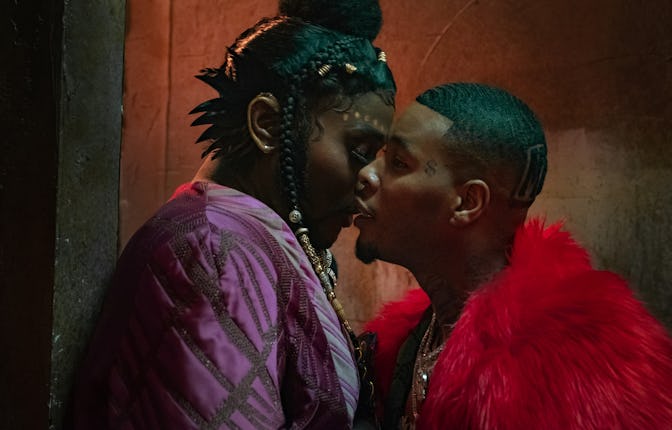P-Valley is showing Black gay sex beyond any stereotype
The hit show’s queer sex scenes this season challenged TV gender norms — and revealed a lot about viewers in the process.

If you haven’t been paying attention, you could easily dismiss the Starz drama P-Valley as just a show about strippers. In actuality, the stripping — depicted as a form of strength and exceptional talent — is merely a vehicle to illustrate stories of struggle, love, and the freedom to exist. Though centering sex workers on television still inspires a good amount of pearl-clutching, it isn’t the strippers who’ve received backlash during season 2, whose finale aired Sunday. The recent sex scenes between the show’s Black gay characters have been heavily scrutinized, even as those radical depictions of queer love continue to progress conversations around tolerance.
Set in the fictional, deep-South town of Chucalissa, Mississippi, P-Valley follows the lives of a strip club’s non-binary den mother, Uncle Clifford (Nicco Annan), and their flock of dancers. Season 1 introduced a budding yet under wraps connection between the ultra-femme Clifford and actor J. Alphonse Nicholson’s character Lil Murda, a rising, street-tough trap rapper hiding his sexual inclinations as he catapults into local fame. Of course, it’s tricky to view a show solely through the lens of social media, but P-Valley is the type of series that inspires digital water cooler conversation, and while some viewers have taken offense to Uncle Clifford and Lil Murda’s romantic advances, those in the queer community have come to love them for their representation. It wasn’t until season 2, when Lil Murda reunites with Big Teak — a previously incarcerated and emotionally burdened childhood friend and lover played by John Clarence Stewart — that the backlash reached fever pitch.
In particular, it was Lil Murda and Big Teak’s only sex scene, where the two engage in intense and explicit love-making. After the episode aired in July, comedian Lil Duval tweeted that the show needed a “super gay advisory on movies like they got for everything else. Cuz That’s a lot to see if u not use to it.”
“When people comment [on social media], they’re exposing themselves,” explains P-Valley creator Katori Hall. “They’re exposing where they are in terms of their own comfort, and often, they’re exposing their ignorance about how the world truly is. And [Nicholson] is standing in a very tough position having to hold space for conflict and difficult conversations.”
It’s not the scene itself that resurrects discomfort in viewers, considering that the show, down to that same episode, features hot-and-heavy sexual interactions between women. More likely, it’s the masterful way that P-Valley portrays all three characters — Uncle Clifford, Lil Murda, and Big Teak — that challenges viewers’ understanding of femininity and masculinity. Each one shatters stereotypes with nuance that makes uncomfortable viewers rail against it. Audiences might even have an easier time digesting an on-screen gay relationship between a hyper-masculine man and an effeminate significant other, a la Omar Little (Michael K. Williams) on The Wire. Anything outside of that dynamic exposes the gaps in understanding — and ultimately, acceptance — of gender and sexuality expressions that defy convention and expectations. P-Valley’s sex scenes reveal what’s a thorny subject among seemingly tolerant Black viewers. But culture and entertainment journalist Tre’vell Anderson points out just how important these stories are to humanizing queer people “who live life and show up in the world in the ways that Lil Murda or Big Teak or Uncle Clifford do.”
“Everyone should have the opportunity to see slices of their life on screen, including non-binary and trans folks,” Anderson says. “We are often just the sassy best friend or the hairdresser. We aren’t often rendered on screen as the caretakers, the pseudo parents of a community, people who are sexual beings who do it like the rest of you. But as a Black non-binary femme individual, I want to let people know that we have the sex, too.”
Fans also had to contend with their beliefs around sex and queerness when Lil Murda took a submissive sexual position with Uncle Clifford in season 2. (In other words, he is vers, and in this scene, positioned himself as a bottom.) “So I like #PValley and I think it’s a great show,” one viewer tweeted. “I also feel that I am okay with #LGBTQ representation and scenes. I will say the Uncle Clifford and Lil’ Murda recent love scenes made me feel awkward or uncomfortable.”
“Masculinity and femininity do not always align with the stereotype,” Anderson notes. “As a society, we make these assumptions based on how masculine or feminine a person is. And we use that to prescribe how people are supposed to show up in the bedroom, where many of us show up differently than who we are in our daily lives.”
The criticism of P-Valley’s Black gay relationships isn’t new or shocking. The Mississippi Delta happens to be the perfect backdrop for a show that challenges anti-gay rhetoric, given how much the South is synonymous with the Black Church and broad rejection of sexual expression within those institutions — even though, as Hall says, “We all know Big Teaks, Lil Murdas, and Uncle Cliffords.” P-Valley’s presentation of radical Black gay love inspires viewers to genuinely challenge their expectations and “everything that they have thought as it relates to the private lives of queer and trans people,” Anderson says.
“P-Valley is some people’s first encounter with people who are like Uncle Clifford,” Hall says. “So if people can get past their preconceived notions, their prejudices, then it allows them, through a TV show, to cultivate a relationship with someone who’s an Uncle Clifford, a Big Teak, a Lil Murda. Art and storytelling can be a bridge to people having a more open heart and being more progressive, especially if they can’t do it in their real lives just yet.”